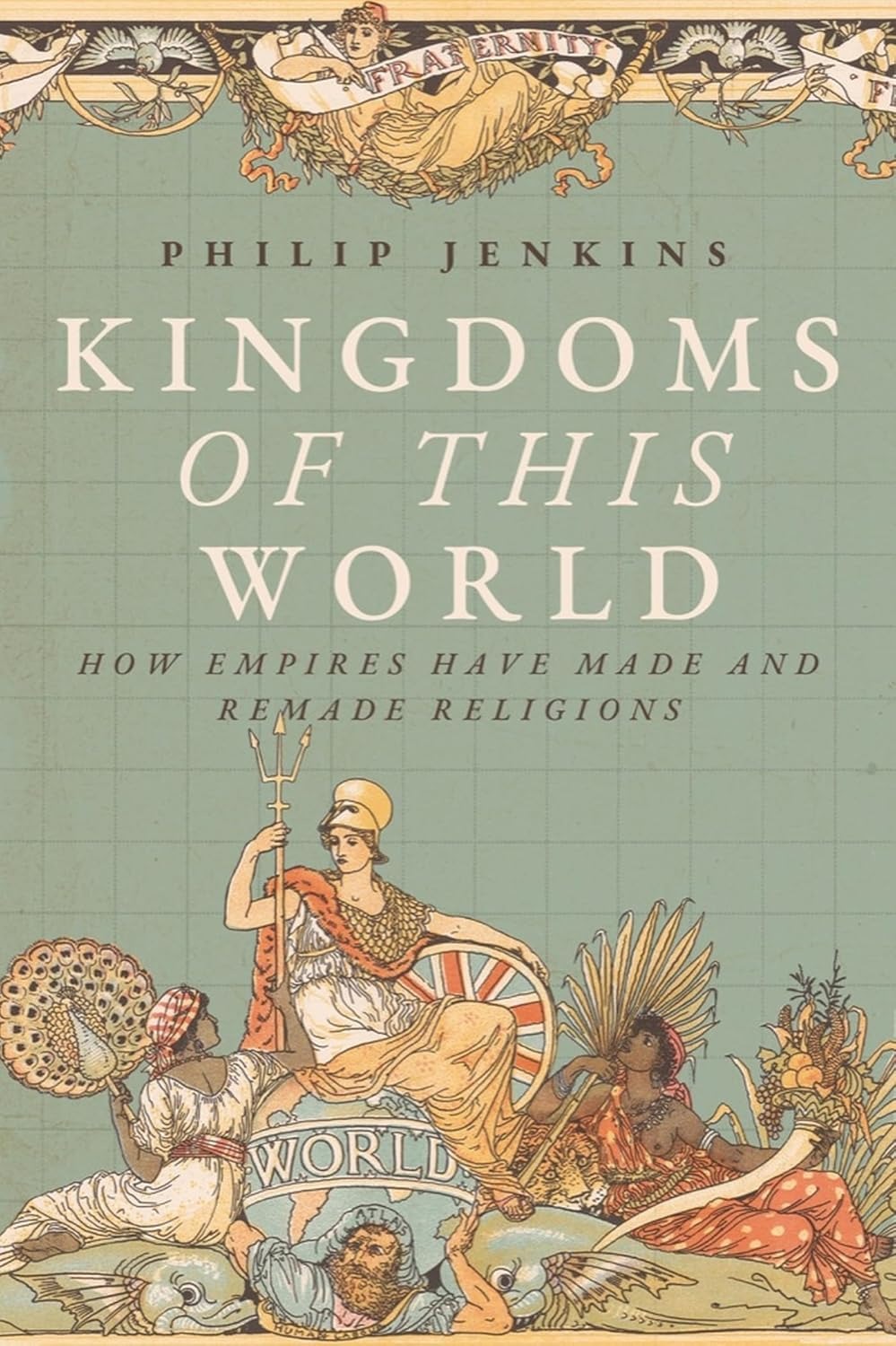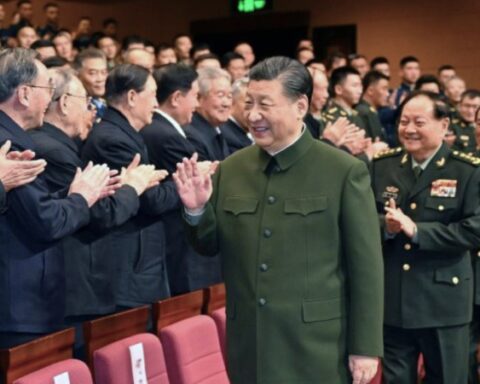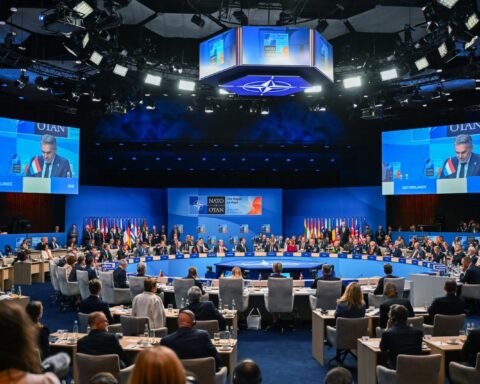In February 2022, when Russia launched its second invasion of Ukraine, Patriarch Kirill of Moscow and All Russia blessed the invading forces as “the active manifestation of evangelical love for neighbors.” Later that year, Kirill dubbed Vladimir Putin “fighter against the Antichrist” and “chief exorcist.” This kind of thing is hard to reconcile with the rationalist creed of American analysis, so the analysts mostly ignore it or adduce it as proof that Putin has gone mad. The liberal dogma known as political science can, in its realist mood, comprehend Russia’s strategic interest in Ukraine, and especially Crimea. We all recognize imperialism as the vice of a disordered and depraved past, and postimperial revanchism as the twitch of a phantom limb that was sawn off for everyone’s benefit. But we prefer not to recognize our own shadow.
Our world was made by empires and religions, not nation-states and constitutions. The liberal world order that the United States sponsored after 1945 is, like its domestic order, an empire in all but name. The United States was the first postcolonial society, so perhaps it should not surprise us that it became the first postmodern empire. America walks and quacks like an imperial duck, but it chooses not to take up the burden of the feathered helmet, the imperial signifier that had previously marked the species. The rest of the world is not taken in. We see you.
We also see the similarly postmodern way in which the United States is a Christian nation in both observance and the breach, especially when it believes it is not. Patriarch Kirill’s observations about anti-Christs and exorcists are typical of the snug alliance of religion and politics throughout imperial history. The breach is the Anglo-Saxon rhetoric that substituted the transnational legalism of human rights for the Christian imperative of saving souls. Both God and the United Nations presume universal dominion. Neither can enforce it without an army. All empires have proudly hung their banners on their palaces and called it eternity. The American non-empire happens to hang the Pride flag from its embassies and call it progress. As Eric Voegelin noted at extravagant length in his survey of politics as religion, the exceptionalism of Western imperium lies in its missionary discontinuities.
To resolve this blurring of empirical realities, there should be more books like Philip Jenkins’s Kingdoms of This World. Jenkins, a history professor at Baylor University, has written an expert and lucid guide to the historical role of empire and its sustained but variegated interaction with religion. All the global faiths are here. The era of European power that we misname the Age of Empire is set firmly in perspective as one age among many. The allegedly timeless religions of Asia are revealed as dynamic and remade in modernity by “imperial shock.” In little more than two hundred pages, Jenkins rewrites the history of the world, explaining how religion, the universal condition, has been shaped by empire, the conditional universal. If the academy were not a hotbed of missionary discontinuity and grade inflation, Kingdoms of This World would, as Edward Said’s Orientalism did in the 1980s, reshape the intellectual landscape, only this time for the better.
If more books like this are not forthcoming, blame Vladimir Lenin. In 1916, shortly before he got a proper job, Lenin wrote Imperialism: The Highest Stage of Capitalism. Lenin cited Imperialism, a 1902 book by the British socialist John A. Hobson, as the “principal” source of his analysis. Hobson had expanded on Marx and Engels’s theory that capitalism created imperialism. European industrialists, Hobson’s theory went, had to send their surplus production overseas if they wanted to keep prices at home high. The parasitic oligarchs had to invest their filthy lucre somewhere, and their governments had to protect their investments.
Hobson’s theory was as manifestly untrue as his claim in 1900 that “Jew Power” caused the Boer War, with “Jewish financiers” forcing the biggest empire in the history of the world to dance to their “diabolical tune.” Untruth was no obstacle to Hannah Arendt’s reheating this allegation in The Origins of Totalitarianism (1951). Arendt explained Nazism as an affronted (and inexplicably delayed) response to the impertinent success of Jews in British-controlled southern Africa.
Empires are complex machines, so theorizing about them seems to inspire monocausal mania. The mania of socialist revolution made a high principle of dismissing empire as a mode of capitalist production and a dream of false consciousness and religion as the monocausal rabbit lurking in the conjuror’s sleeve. Yet Soviet Russia shunted subject populations around just as the czars had done and as communist China still does. Shia imperialism is not an invention of the clerical tyranny in Iran, and Persian imperialism was not an invention of the Fatimids.
Kingdoms of This World corrects the record on empire’s implications for religion. The first great Persian empire, the Achaemenid empire founded by Cyrus the Great in 550 B.C., was the world’s largest yet. The administrations of its successors marched in the Achaemenids’ track, from Alexander the Great’s eastern empire to the Seleucids and from the Parthians to the Sasanians, both of which were enemies of Rome and Byzantium. The official religion of all these Persian empires was Zoroastrianism.
The Hebrew Bible’s “denunciations of empire,” Jenkins writes, conceal the fact that the ancient Jews “actually spent long periods living fairly contentedly” under foreign rule. Monotheism emerged from imperial experiences—primally in Egypt, but again after the Assyrian destruction of the Northern Kingdom of Israel in 722 B.C. The prospect of “mass deportations and cultural annihilation” galvanized the theology of the Southern Kingdom of Judah. Hard times make hard priests: Judahite institutional religion became a “strict and uncompromising monotheism.”
After the Babylonian Exile, the Assyrian tyrant Sargon II “offered a prototype for Satan” (Isaiah records his proto-Luciferian title: “Son of the Morning”). Meanwhile, good old Cyrus became “the first draft for the Messiah.” The influence of Zoroastrianism on Second Temple Judaism and early Christianity remains academically “controversial,” which in this case means hard to quantify. The returnees’ baggage included Zoroastrian influences such as the dualistic cosmic struggle of light and darkness, a fondness for angels, and even a theology of the soul, all of which Patriarch Kirill would recognize.
Thoroughly Hellenized under Alexander’s heirs, the Judeans gave a name to another imperial pattern: diaspora. In a “pioneering era of globalization,” substantial diaspora communities developed at some of the world’s largest urban centers. Jenkins traces a “Hellenistic triangle” between the Seleucid capital of Antioch in Syria, the Ptolemaic capital of Alexandria in Egypt, and Ctesiphon, which stood near ancient Babylon and became the Parthian, and later Persian, metropolis. The triangle remained pivotal to political and religious exchange until the rise of Islam, which may yet eclipse Christianity as the most popular imperial religion of the modern age, at least among its followers.
Augustus, the first Roman emperor, assumed the office of pontifex maximus because the Roman state, republican or imperial, pagan or Christian, abhorred disorder in religion. The pagan state’s task was to harmonize gods and men. The early Christian church had Romanized itself, even in its opposition, by conforming to the imperial template of provinces and local religious authorities. The Christianization of the New Rome between Constantine the Great and Justinian followed pagan precedent, Greek and Latin. Meanwhile, the Syriac-speaking Church of the East adopted an ecclesiastical hierarchy after the Persian model.
The Roman papacy, Hobbes saw, was “not other than the ghost of the deceased Roman Empire, sitting crowned upon the grave thereof.” Its Eastern counterpart, Jenkins observes, was “the phantom of Persian times, and even of Hellenistic eras.” The ghost of Buddhist empire attended the rise of Hindu power, though Buddhism retained a presence and remained intimately bound with state power in Korea, Japan, and Tibet. As ever, the recipients of the “harshest examples of persecution and naked compulsion” under Islam occurred during intra-Muslim conflicts. The “relative success” of the rival Islamic traditions was “heavily determined” by the rise and fall of the empires that favored them.
Much the same went for the empires of Christian Europe. The populations of Christian sectarians in today’s map of nation-states mostly live in the historic footprints of the British, French, and Iberian empires. Anglicanism is the third-largest Christian communion. In notional terms, its largest cohort belongs to the Church of England, though its English cohort only turns up to be “hatched, matched, and despatched.” In functional terms, today its largest cohort is the eighteen million Anglicans of Nigeria. The Nigerian communion is a “ghost” of a departed empire.
Yet there were three crucial differences between Islam in its medieval pomp and Christianity in its modern heyday. The British were the key exponents of all three differences. Every previous empire, including the early British Empire, practiced slave trading. Only the British devoted massive resources to annulling it. The motive, and the creed of the activists who forced it through Parliament, was Christian humanitarianism. Every empire, the British included, evangelized its subjects, but only in the “white dominions” did the British settle in numbers sufficient to assure the triumph of Christianity. Even then, they encouraged other faiths.
The third unique development, a new kind of cultural evangelism, was also shaped by Christianity and carried across the world, most notably in India. The British were a tiny minority of interlopers in India, ruling a variegated and sophisticated civilization whose religions predated Christianity. They wanted to enlighten and modernize the Indians in order to make India a rational, technical, and liberal society, not just a subject satrapy. J. R. Seeley’s quip that the British found that they had conquered half the world “in a fit of absence of mind” is not entirely accurate. Even as the British deepened their engagement in India, they consciously prepared to leave it.
Lord Macaulay’s speech in the India Bill debate of 1833 recognized the paradox of liberal imperialism and embraced it. The challenge, Macaulay said, was to create a native elite who could take over when they were ready, and a national identity that could hold people together. Contemporary observers, British and Indian alike, recognized the universality of religious sentiment. The budding academic discipline of comparative religion, its growth accelerated by imperial exchanges, offered a framework for mutual enrichment. The Westerners cherry-picked Eastern religion for what they came to call “spirituality,” the antidote to the ennui of rationalism. The Easterners learned the Christian truth that religion was political, though religion and politics were supposed to be separate spheres.
This obliged the Easterners to domesticate Western concepts of religion. Japanese scholars invented a new category, shukyo, to “delineate religion as opposed to morality or civic ethics.” The word went into Chinese as zongjiao, the modern term for “religion.” Hindus learned to understand themselves as practicing a religion called “Hinduism.” Buddhism underwent an even more comprehensive imperial “invention.” As usual in empires, India’s traditional elites received a formal and informal imperial education, just as the Judahite exiles had in Babylon. As usual in empires, the centrality of religion in the sharpened, modernized self-image of the elites made religion central to their revolt into an even sharper religiopolitical self-image, just as it had been for the Protestants of colonial America.
As usual in empires, the European Christians directed the mass movement of subject peoples, then experienced the immigration of their subjects’ children. The retreat of European empire encouraged the rise of religiopolitical ideologies, notably Islamism, that had been seeded in the imperial encounter. It also left minority populations stranded, and frequently threatened. The mass immigration of the descendants of empire, notably Muslims, now threatens the stability of liberal nation-states. It may yet topple the other Western empire that pretends not to be an empire, the European Union.
*Dominic Green’s books include Three Empires on the Nile: The Victorian Jihad, 1869–1899 and The Religious Revolution: The Birth of Modern Spirituality, 1848–1898. A fellow of the Royal Historical Society, he is a contributor to the Wall Street Journal and a columnist at the Washington Examiner.
Source: https://modernagejournal.com/religion-and-empire-inseparable/249455/






